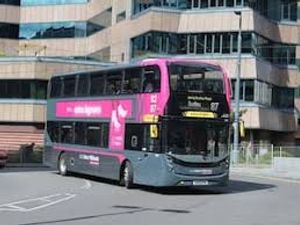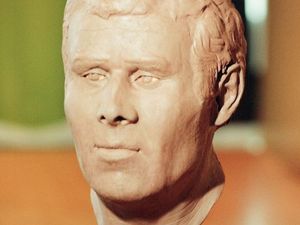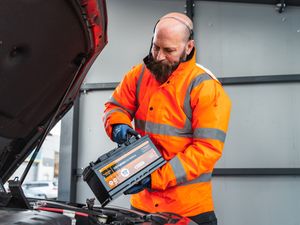'Daylight did not come' - I met victims of horror Turkey earthquake still living a bleak existence 20 months on
“I am under rubble, please come and save me,” read the message from Yeter's relative - but she received it too late.
Watch more of our videos on ShotsTV.com
and on Freeview 262 or Freely 565
Last year on February 6, a devastating earthquake shook southern Turkey, killing more than 53,000 mothers, daughters, fathers and sons. A year and a half on, hundreds of thousands of people are still victims to the 7.8-magnitude monster that tore their world to the ground.
My grandad and I drove from our family's hometown of Anamur across the country to Hatay, a province where the population has reduced from 1.7 million to just 250,000. Coming off the motorway into the city, more and more piles of rubble gradually came into view.
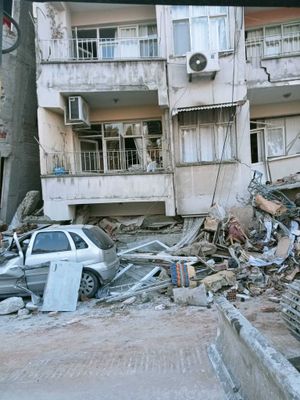
What were once people’s homes were now huge mounds of concrete and metal. There was such devastation it almost didn’t look real, it looked like a film set. But it was right in front of our eyes. Streets where children would play, benches where teens would talk and laugh, kitchens where grandmas would lovingly cook for their families were all gone forever.
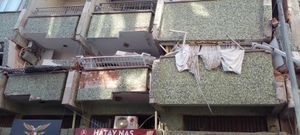
I was curious when I started to see hundreds of rows of white containers – I soon realised these were the temporary houses. More than 600,000 people are still living in these little boxes. Whitewashed, dystopian camps that seemed to be never-ending. I kept driving, but I pulled over when I saw a little city under a blue tarpaulin ‘roof’.
About 20 families were living under there, their whole lives between four hanging bed sheets.
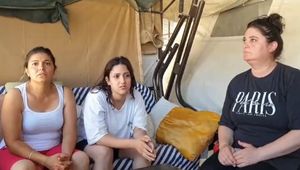
I spoke to a girl, Nihal, who was 16 and dreamed of coming to England. She has merely been existing, she said, since moving into the barely three metre square space with her mother, aunt and grandma.
Her mother, Yeter, told me how their never-ending nightmare began when they were living in Antakya.
“We were in the house and the ceiling collapsed on top of us. It kept falling, it kept hitting and hitting us, one after another. We could not stand still but we could not get out. From beginning until end we were living it.
“I was cut here,” she said, pointing at her face. “My daughter’s head was cut open.”
“We ran towards the door, but we couldn’t open it,” she said. “Our neighbours broke it down to get us out. That is how we managed to escape. Unbelievable torrential rain began. It was raining so much and it was pitch black.”
Yeter watched the buildings crumble around her.
“It was so bad, everybody was screaming. The tall buildings had collapsed to the ground. Some people were dead, some people were injured. They were screaming ‘help me, save me’ but one could not help. One could not get close to the building because it could just collapse.
“It was so cold and wet. The ground was still quaking. We got ourselves to flat ground. The signal was gone and our phones did not work, we couldn’t reach anyone.
“One begins to think about their relatives. We waited there for daylight, but it did not come. It felt like forever. It came at around 10am the next day, and once we had the light we went to find our relatives.
“They were under rubble.” Yeter began to cry.
“We lost them.”
Her sister put her arm around her.
They received a message from a relative saying “I am under rubble, please come and save me” but it did not reach them until it was too late.
Two of Yeter’s nieces died along with their dad, her brother. One of her nieces survived, but had to have her arm and feet amputated.
“If I got the message sooner, maybe she would have her feet,” said Yeter.
Plain rice and beans is all they have eaten every single day for a year and a half, and their living conditions are "abominable". Their future is bleak and without hope.
Yeter’s family, much like others who are still living there, say money is extremely scarce and they can’t even find bottled water easily, but they cannot bring themselves to leave the place they still call home.
In Turkey, 37,066 buildings collapsed and over 200,000 were heavily damaged. Rebuilding will take years, and people need money, provisions, and psychological help - many of them never found their loved ones and are unable to grieve.
Victims of the disaster still need help and donations, which can be made using the links below:
West Midlands Turkish Association - www.facebook.com/groups/366199749498473/about or www.charitychoice.co.uk/west-midlands-turkish-association-1208073
AHBAP - https://ahbap.org/

